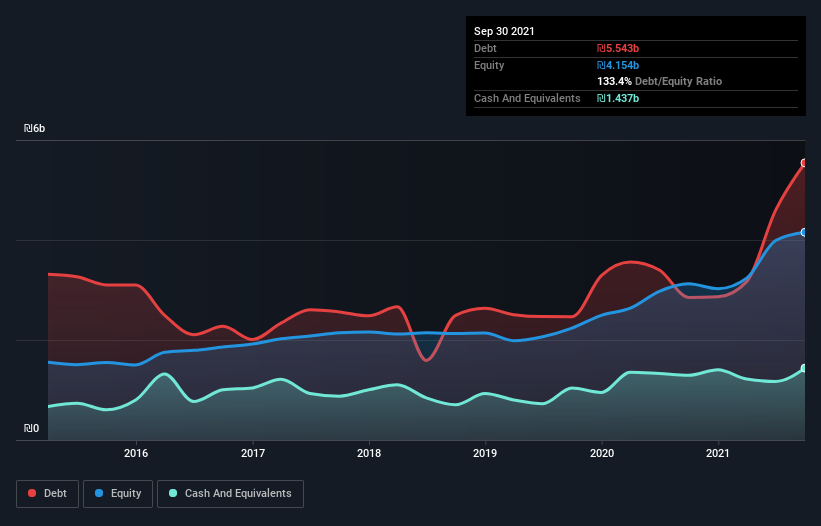The external fund manager backed by Berkshire Hathaway's Charlie Munger, Li Lu, makes no bones about it when he says 'The biggest investment risk is not the volatility of prices, but whether you will suffer a permanent loss of capital.' So it might be obvious that you need to consider debt, when you think about how risky any given stock is, because too much debt can sink a company. We can see that Elco Ltd. (TLV:ELCO) does use debt in its business. But the real question is whether this debt is making the company risky.
When Is Debt Dangerous?
Generally speaking, debt only becomes a real problem when a company can't easily pay it off, either by raising capital or with its own cash flow. Ultimately, if the company can't fulfill its legal obligations to repay debt, shareholders could walk away with nothing. While that is not too common, we often do see indebted companies permanently diluting shareholders because lenders force them to raise capital at a distressed price. Of course, the upside of debt is that it often represents cheap capital, especially when it replaces dilution in a company with the ability to reinvest at high rates of return. When we think about a company's use of debt, we first look at cash and debt together.
Check out our latest analysis for Elco
What Is Elco's Debt?
You can click the graphic below for the historical numbers, but it shows that as of September 2021 Elco had ₪5.54b of debt, an increase on ₪2.85b, over one year. However, it does have ₪1.44b in cash offsetting this, leading to net debt of about ₪4.11b.

A Look At Elco's Liabilities
The latest balance sheet data shows that Elco had liabilities of ₪7.55b due within a year, and liabilities of ₪7.09b falling due after that. Offsetting these obligations, it had cash of ₪1.44b as well as receivables valued at ₪4.00b due within 12 months. So its liabilities total ₪9.20b more than the combination of its cash and short-term receivables.
Given this deficit is actually higher than the company's market capitalization of ₪7.43b, we think shareholders really should watch Elco's debt levels, like a parent watching their child ride a bike for the first time. In the scenario where the company had to clean up its balance sheet quickly, it seems likely shareholders would suffer extensive dilution.
We use two main ratios to inform us about debt levels relative to earnings. The first is net debt divided by earnings before interest, tax, depreciation, and amortization (EBITDA), while the second is how many times its earnings before interest and tax (EBIT) covers its interest expense (or its interest cover, for short). This way, we consider both the absolute quantum of the debt, as well as the interest rates paid on it.
Elco's net debt is 3.0 times its EBITDA, which is a significant but still reasonable amount of leverage. However, its interest coverage of 10.3 is very high, suggesting that the interest expense on the debt is currently quite low. Importantly, Elco grew its EBIT by 64% over the last twelve months, and that growth will make it easier to handle its debt. When analysing debt levels, the balance sheet is the obvious place to start. But you can't view debt in total isolation; since Elco will need earnings to service that debt. So when considering debt, it's definitely worth looking at the earnings trend. Click here for an interactive snapshot.
Finally, a company can only pay off debt with cold hard cash, not accounting profits. So we clearly need to look at whether that EBIT is leading to corresponding free cash flow. In the last three years, Elco's free cash flow amounted to 23% of its EBIT, less than we'd expect. That's not great, when it comes to paying down debt.
Our View
We feel some trepidation about Elco's difficulty level of total liabilities, but we've got positives to focus on, too. To wit both its EBIT growth rate and interest cover were encouraging signs. Taking the abovementioned factors together we do think Elco's debt poses some risks to the business. So while that leverage does boost returns on equity, we wouldn't really want to see it increase from here. The balance sheet is clearly the area to focus on when you are analysing debt. But ultimately, every company can contain risks that exist outside of the balance sheet. To that end, you should be aware of the 2 warning signs we've spotted with Elco .
If you're interested in investing in businesses that can grow profits without the burden of debt, then check out this free list of growing businesses that have net cash on the balance sheet.
Valuation is complex, but we're here to simplify it.
Discover if Elco might be undervalued or overvalued with our detailed analysis, featuring fair value estimates, potential risks, dividends, insider trades, and its financial condition.
Access Free AnalysisHave feedback on this article? Concerned about the content? Get in touch with us directly. Alternatively, email editorial-team (at) simplywallst.com.
This article by Simply Wall St is general in nature. We provide commentary based on historical data and analyst forecasts only using an unbiased methodology and our articles are not intended to be financial advice. It does not constitute a recommendation to buy or sell any stock, and does not take account of your objectives, or your financial situation. We aim to bring you long-term focused analysis driven by fundamental data. Note that our analysis may not factor in the latest price-sensitive company announcements or qualitative material. Simply Wall St has no position in any stocks mentioned.
About TASE:ELCO
Elco
Operates in the construction, infrastructure, consumer electronics, telecommunications, entertainment, and real estate sectors in Israel and internationally.
Slight risk unattractive dividend payer.
Market Insights
Community Narratives




